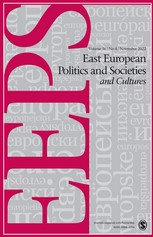Interpretative Frames, Phenomenology, and the Question of the Republican Character of Polish and Czech Dissident Movements of the 1970s and 1980s
Interpretative Frames, Phenomenology, and the Question of the Republican Character of Polish and Czech Dissident Movements of the 1970s and 1980s
Author(s): Elżbieta Ciżewska-MartyńskaSubject(s): Political Philosophy, Political history, Government/Political systems, Politics and society, Post-War period (1950 - 1989), Phenomenology
Published by: SAGE Publications Ltd
Keywords: Solidarity; phenomenology; republicanism; interpretative frames; dissidence;
Summary/Abstract: The Polish Solidarity movement of 1980–1981 and the Czechoslovak dissident movement both developed an original model of democracy. The dissidents sought to reconcile the tensions between the individual and the community—personal independence and engagement with public affairs—by building a pluralist, debating civic community entrenched in objective values. Calling upon on the phenomenological tradition and the interpretative frames perspective used in social movement studies, the author seeks to interrogate the intellectual roots of the dissident vision of democracy and the reasons behind one of its future interpretations, which viewed it through the lens of the republican political tradition. Drawing on the popularity and the character of the phenomenological tradition, the author explains the differences in the understanding of community in Poland and Czechoslovakia.
Journal: East European Politics and Societies
- Issue Year: 36/2022
- Issue No: 03
- Page Range: 867-891
- Page Count: 25
- Language: English
- Content File-PDF

